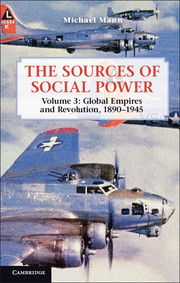Book contents
- Frontmatter
- Contents
- Preface
- 1 Introduction
- 2 Globalization imperially fractured
- 3 America and its empire in the Progressive Era, 1890–1930
- 4 Asian empires
- 5 Half-global crisis
- 6 Explaining revolutions
- 7 A half-global crisis
- 8 The new deal
- 9 The development of social citizenship in capitalist democracies
- 10 The Fascist alternative, 1918–1945
- 11 The Soviet alternative, 1918–1945
- 12 Japanese imperialism, 1930–1945
- 13 Explaining the Chinese revolution
- 14 The last interimperial war, 1939–1945
- 15 Conclusion
- Bibliography
- Index
5 - Half-global crisis
World War I
Published online by Cambridge University Press: 05 November 2012
- Frontmatter
- Contents
- Preface
- 1 Introduction
- 2 Globalization imperially fractured
- 3 America and its empire in the Progressive Era, 1890–1930
- 4 Asian empires
- 5 Half-global crisis
- 6 Explaining revolutions
- 7 A half-global crisis
- 8 The new deal
- 9 The development of social citizenship in capitalist democracies
- 10 The Fascist alternative, 1918–1945
- 11 The Soviet alternative, 1918–1945
- 12 Japanese imperialism, 1930–1945
- 13 Explaining the Chinese revolution
- 14 The last interimperial war, 1939–1945
- 15 Conclusion
- Bibliography
- Index
Summary
During the first half of the twentieth century, the world was deeply fractured by two great wars. Indeed, it is conventional to treat the period 1914–1945 as a complete contrast to the periods preceding and following it, a period in which conflict and chaos reigned. No one would dispute the fracturing that occurred in this period, but I have already emphasized fractures that were in place well before the war. We will see how the Great War mainly intensified these.
After a century of only small wars in Europe, the Great War struck the continent like a cataclysm. Its epicenter may have been Europe, but it reverberated across most continents to become nearly global. I discussed its causes at greater length in Chapter 21 of Volume II, although I now add more of an emphasis on the European warrior culture (discussed in Chapter 2) that had spread aggressive imperialism within the continent and overseas. In the nineteenth century, wars had receded in Europe as their increasing devastation became apparent and the Great Powers formed alliances intended to deter them. By 1914, the two main alliances ranged Germany, Austria-Hungary, and Italy against Russia, France, and Britain, with the Ottoman Empire unaligned. The balance of power had entered diplomatic discourse as something that could prevent war. Yet war was still the default mode of diplomacy, militaries continued to modernize, and the continent’s young men were conscripted and trained as reserve troops – all well before this war. Only Britain, with a capital-intensive rather than labor-intensive military, lacked conscription. Children (boys and girls) read stories of romantic and heroic imperial adventure and socialized into a militaristic culture. Europeans were still from Mars. Europe was what in previous volumes I called a multi-power-actor civilization, composed of many distinct, competitive actors emerging from all four sources of power and all thoroughly decentralized. There I praised the dynamism of this configuration in generating the “European Miracle” of unprecedented economic growth. There is no necessary reason why multistate systems should generate much war, but when they come enveloped in a culture of militarism, as Europe did, it is likely to generate endless war and competitive imperialism.
- Type
- Chapter
- Information
- The Sources of Social Power , pp. 129 - 166Publisher: Cambridge University PressPrint publication year: 2012



